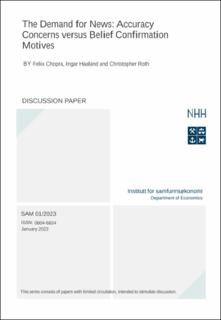| dc.contributor.author | Chopra, Felix | |
| dc.contributor.author | Haaland, Ingar | |
| dc.contributor.author | Roth, Christopher | |
| dc.date.accessioned | 2023-01-30T13:37:30Z | |
| dc.date.available | 2023-01-30T13:37:30Z | |
| dc.date.issued | 2023-01-12 | |
| dc.identifier.issn | 0804-6824 | |
| dc.identifier.uri | https://hdl.handle.net/11250/3047165 | |
| dc.description.abstract | We examine the relative importance of accuracy concerns and belief confirmation motives in driving the demand for news. In experiments with US respondents, we first vary beliefs about whether an outlet reports the news in a right-wing biased, left-wing biased, or unbiased way. We then measure demand for a newsletter covering articles from this outlet. Respondents only reduce their demand for biased news if the bias is inconsistent with their own political beliefs, suggesting a trade-off between accuracy concerns and belief confirmation motives. We quantify this trade-off using a structural model and find a similar quantitative importance of both motives. | en_US |
| dc.language.iso | eng | en_US |
| dc.relation.ispartofseries | SAM DP;01/2023 | |
| dc.subject | News Demand, Media Bias, Accuracy Concerns, Belief Confirmation | en_US |
| dc.title | The Demand for News: Accuracy Concerns versus Belief Confirmation Motives | en_US |
| dc.type | Working paper | en_US |
| dc.source.pagenumber | 109 | en_US |
| dc.relation.project | Norges Forskningsråd: 262675 | en_US |
